i-MADE Allows Engineering Underclassmen to Do Healthcare Design, Plus Help Others
March 18, 2020
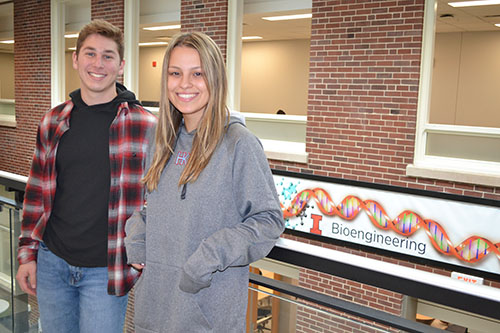
Bioengineering students, Danny Rosen and Gianna Mizzi.
The new i-MADE RSO (Illinois Medical Advancements through Design and Engineering) is giving its members the best of both worlds. For instance, they’re gaining experience designing medical-field-related projects that will help them get jobs down the road. However, these projects don’t just look good on their resumes; i-MADE members are also getting the chance to make some people's lives better.
In spring of 2019, Gianna Mizzi, Danny Rosen, and Kristin Slaughter, three current Bioengineering (BioE) juniors, decided they were missing something as they prepared for their careers…a way to get experience doing design projects early on during their time at Illinois. Currently, most BioE students don’t have an opportunity to do any hands-on engineering applications until their senior design project, which they felt was a bit too late.
“Once we apply for jobs, they ask what technical skills we have, what experience we have, and we can't say anything,” Mizzi explains.
While discussing the issue with BioE Professor Jenny Amos, who gets lots of students coming to her for these types of issues and often has to turn students away, they discovered that BioE had previously tried to start a way to enable students to do design projects, but it hadn’t lasted.
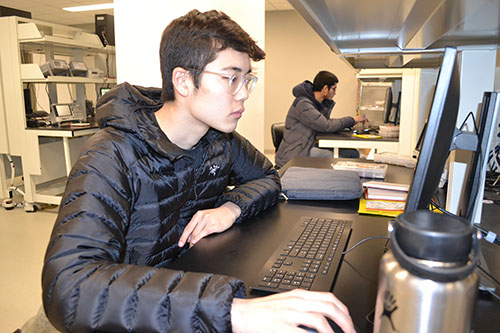
An i-MADE member learning the intricacies of Computer Aided Design (CAD) during the Spring 2020 CAD workshop.
So the three decided to be proactive. “Well, why don't we do that?” Mizzi suggested. Consequently, during the spring 2019 semester, they started an organization—i-MADE—where students could gain the design experience they need.
“We do it, and we don't get paid, necessarily, don't have any reason for us to do the work besides the fact that we want to and the fact that we want to get these sorts of experiences.”
From that unassuming beginning, the idea grew. After some administration and some recruiting, they’ve gotten to where they are today: i-MADE is an official RSO (registered student organization) with 18 members. However, the year-old RSO hasn’t grown to this point without some growing pains. For example, since none of the three co-founders had ever created an organization, first they had to figure out how to do it, which they accomplished through lots of networking. “So, it was a big learning curve,” Mizzi admits. “But, from there, we were able to really grow, and we've seen a lot of interest from the student side, from the client side, and all of that.”
One crucial task was to recruit students. So towards the end of fall 2019, they appealed to the Bioengineering Department as well as Grainger College of Engineering to circulate an application via email. After interviewing 30 applicants, they accepted 13 new members to add to the five executive board members.
According to Mizzi, the idea behind the limited number of recruits was to accept students they knew they could “hold accountable, who were actually willing to put in the time.” They believe iMADE is going to be a bit of a time commitment because they’re planning to get the projects done within a semester. Although some projects will last for a whole year, the goal is to have them on a semester basis, if possible, so students aren’t working on the same project for a long time but get a little variety. “Obviously, with design projects, you never know how long they're going to take,” Mizzi reports.
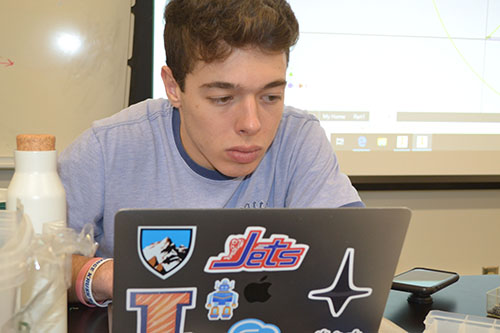
i-MADE Executive Board member Matthew Rosenbaum brushes up on his CAD skills during the group's workshop.
Plus, they weren't exactly sure how many projects they'd have this semester. “We wanted to make sure that everyone who was in our organization would be on a project," says Rosen. "So that's why we wanted to keep it small.”
The founders, all juniors due to graduate next year, also wanted to make sure i-MADE is around to help students for years to come. “We didn't want it to sort of fall apart once we graduated,” Mizzi admits. Thus, they’re recruiting mostly freshmen and sophomores. “I think that'll be reflected in future recruitments, so the organization keeps running and we keep getting fresh people that are able to build the organization and move it forward.”
Securing projects for students to work on was another big task. “A key focus that we've been doing is networking with a lot of healthcare professionals,” Rosen explains. This includes professors, physicians at Carle, as well as others on campus involved with innovation in the healthcare space. iMADE leadership also reached out to a couple of Research Park startups who could potentially need their support.
Mizzi and Rosen report that coming up with the projects proved interesting. The first came courtesy of Jenny Amos. But it wasn’t until the last couple of weeks before the semester started, that they got all the projects they’d need. They recall that Jenny Amos kept sending people to them who had reached out to her about projects. “Which was exciting,” Mizzi explains,” because we were initially a little worried. But then, as soon as the semester started, it picked up like crazy.” In fact, out of six potential projects, they decided to only commit to four this semester. “So we initially came into the semester not knowing if we would have one,” Mizzi explains, “And then we ended up with four!”
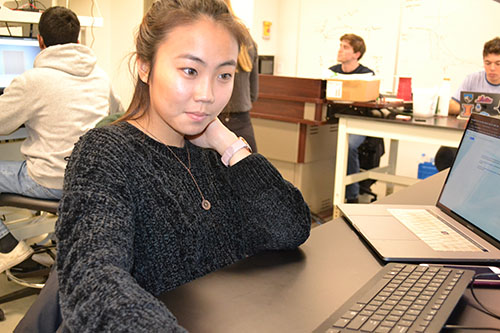
A member of i-MADE experiences CAD during the group's workshop.
So new i-MADE members, who were given the option to choose which projects they wanted to work on as part of their application, will get to work on one of four different healthcare related projects during the Spring 2020 semester. There will probably be three to five members on each project, depending on the project. This semester’s projects come from professors, a PhD student who's friends with Dr Amos, and folks from Carle. While they don’t have any projects yet with industry, they’ve reached out to Research Park companies like Abbott and AbbVie and made connections there. While iMADE hasn’t gotten any projects from them as yet, the companies are interested in working with the group in the future.
One key criteria regarding which projects to commit to was that they make a difference. “We've actually been picking our projects so that it's more working for someone who needs our help.” Their goal was to “to design something for them that's specific to them that will make their life better. That's kind of reflected in our projects for the semester.”
What are the projects like? One is for a patient with cerebral palsy who has a wheelchair with a lap tray. The patient uses the tray both at home and at the Developmental Services Center, but can’t use it on the bus, because it's too hard, and he could be harmed if there were an accident. So the project is to create an all-purpose tray that’s fairly mobile, sturdy enough to hold food and other objects, but is also soft and flexible enough so he can use it on the bus too.
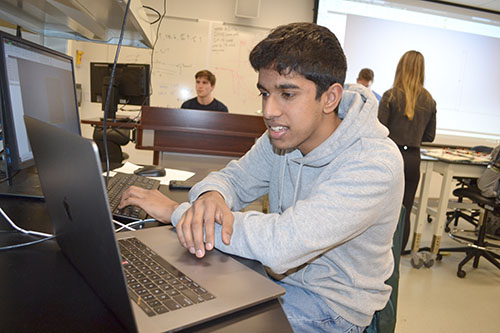
A member of i-MADE experiences CAD during the group's workshop.
Rosen is in charge of the dog project, for which i-MADE students are utilizing both 3D CAD and 3D printing skills in order to design two knee braces for a 1.5 year-old dog with two CCL tears, which will be a cheaper alternative to surgery.
For the Reddit project, headed up by Alex Morain, the Reddit Tool team will be utilizing natural language processing algorithms on the mental health forum r/SuicideWatch. According to Morain, they hope to “provide first responders with an automated breakdown of risk factors identified in suicidal posts to the forum, as well as recommended response strategies to help provide better support to those afflicted with suicidal ideation.”
The final project, the GIBuddy project headed up by Mizzi, will be building a portable breathalyzer-like device that detects hydrogen in the breath that can be used to test for small intestine bacterial overgrowth (SIBO).
While the four projects are technically bioengineering, Mizzi says they lean toward electrical, mechanical, computational, and material (biomaterials) engineering. “Because bioengineering covers a lot of different aspects of engineering,” she says. “So we kind of cover the full range of BioE and what bioengineering is. But in order to do these projects, you obviously need people who are electrical engineers, computer engineers, mechanical engineers.”
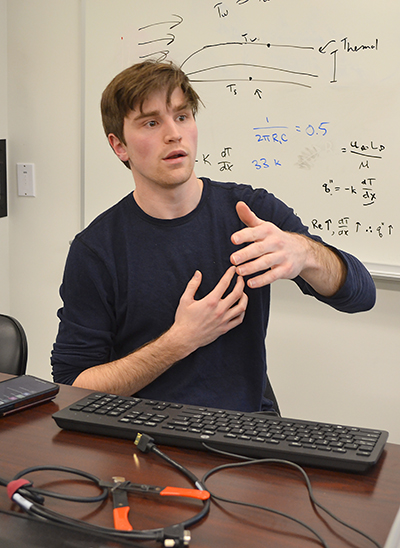
i-MADE Executive Board member Alex Moraine, the VP of Internal Development, teaching a workshop on CAD.
Which is perfect, since, according to Mizzi, their goal is for i-MADE to be interdisciplinary. While they currently have more BioE students, they also have students from other majors. However, during the next recruitment period, they hope get more majors outside of BioE. “We just wanted to be more interdisciplinary,” says Mizzi, “so that you can collaborate with people from a bunch of different backgrounds.”
Regarding why students from other engineering disciplines might be interested in a biomedical organization, Mizzi reports that, in general, a lot of crossover happens within majors, such as tracks for bioengineering within electrical engineering or mechanical engineering, because students are interested in the medical field, but not necessarily in bioengineering.
Although the teams may be interdisciplinary, they’re still comprised mostly of freshmen and sophomores who don’t yet have a lot of engineering experience, won’t necessarily have the skills required to complete the projects, and will most likely need to learn some new ones. That’s why a key component of i-MADE is the technical workshops the VP of Internal Development, Alex Moraine, has been holding in order to equip students with the necessary skills. For example, on February 19th, i-MADE held a CAD (Computer Aided Design) workshop. Other workshops will address breadboarding, 3D printing, and soldering.
“So they're getting these technical workshops this semester so that they can use these skills during the projects,” Rosen explains, “and also just get getting the benefit of learning these skills early on in their college experiences.”
While the leaders have in mind the general structure they eventually want to achieve, they admit that there’s lot of gray area right now in terms of how the organization will be run. “So it's going to be a little bit of a trial period,” says Mizzi. But at this point, leadership team members are leads on the projects. But there’s provision for upward mobility. Students who have expressed an interest in becoming a leader, or who show leadership potential, will start as project managers then be given more responsibility throughout the semester, so they're ready to move up to leadership roles in the future.
Besides its main focus, training workshops and design projects, i-MADE also plans to get involved with other healthcare-related events. For instance, they helped sponsor last fall’s BioE Design-a-thon, and hope to help with this spring’s Health Make-a-Thon, which might enable them to network with potential partners or get future projects.
Since as juniors, the i-MADE founders believe the RSO is “too little, too late” for them, why did they commit to all the effort of starting up an organization?
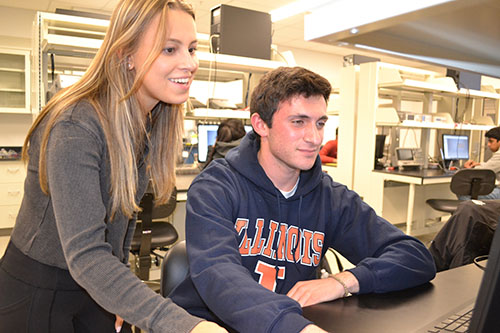
i-MADE Executive Board member Gianna Mizzi interacts with one of the i-MADE members during the CAD workshop.
Kristin Slaughter reports that she has found i-MADE to be personally rewarding and hopes to use the skills she’s gained down the road: “Beginning i-MADE has proven to me the great amount of support available to students in the Grainger College of Engineering. This endeavor has been personally rewarding as I have had the opportunity to connect with professionals in both engineering and medicine, work with students in varying engineering disciplines, and learn valuable skills necessary to organize and run successful ventures. I am very excited to utilize my skills in order to make a difference for those in need of healthcare solutions.”
Concerning the rewards of starting i-MADE, Rosen agrees: “So I guess our main motivation was to help out the younger people in Bioengineering and just engineering in general, just because we didn't get that many opportunities to work on design projects.”
As regards how rewarding he’s found the experience personally, he adds: “It is kind of fun to be able to start something new, and I think it does give us a lot of valuable experience with networking, with learning leadership.” Plus, since both Rosen and Mizzi have internships for this summer (Rosen will be interning at Abbott and Mizzi with GE healthcare), he believes working on some projects this semester will help them in their internships. And while he acknowledges that it's been a lot of trial and error, he asserts, “But it's something that I think will benefit us as we move into our careers and once we graduate.”
Like Rosen, Mizzi acknowledges, “It's nothing that we ever thought we'd be doing. We were just kind of thrown into it.” Regarding their rather altruistic motivations for starting i-MADE, they hoped to give back to the “next generation” of Illinois Engineering students. “Obviously it's a little too late for us, but ideally in the future, we'll be able to benefit the people, and they'll be able to gain those technical skills early on.”
(*Note: Due to the classes being relegated to online and students being encouraged not to return to campus, Daniel Rosen reports that the Reddit tool project will likely be completed but the others may be on hold due to not being able to meet in person. They expect to finish the products sometime after the end of the semester.)
Story and photos by Elizabeth Innes, Communications Specialist, I-STEM Education Initiative
For more related stories, see: Bioengineering & Biomedical Engineering, Undergraduate STEM Education Reform, 2020
For additional istem articles about Bioengineering, see: BioE Design-a-thon, Health Make-a-Thon.
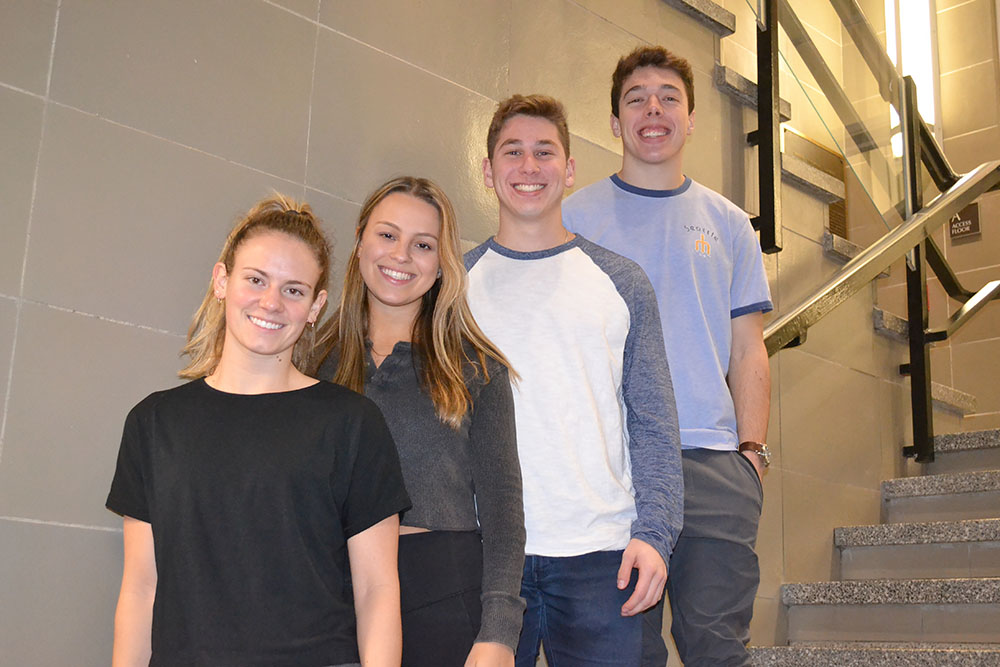
i-MADE Executive Board (left to right): Kristin Slaughter, Gianna Mizzi, Danny Rosen, and Matthew Rosenbaum. The fifth member is Alex Morain, who was teaching the CAD workshop at the time of this photo.













.jpg)
















